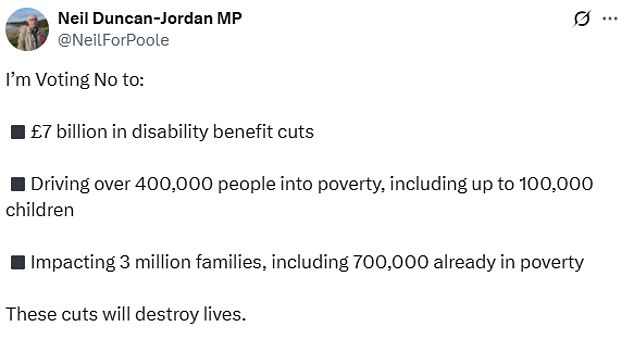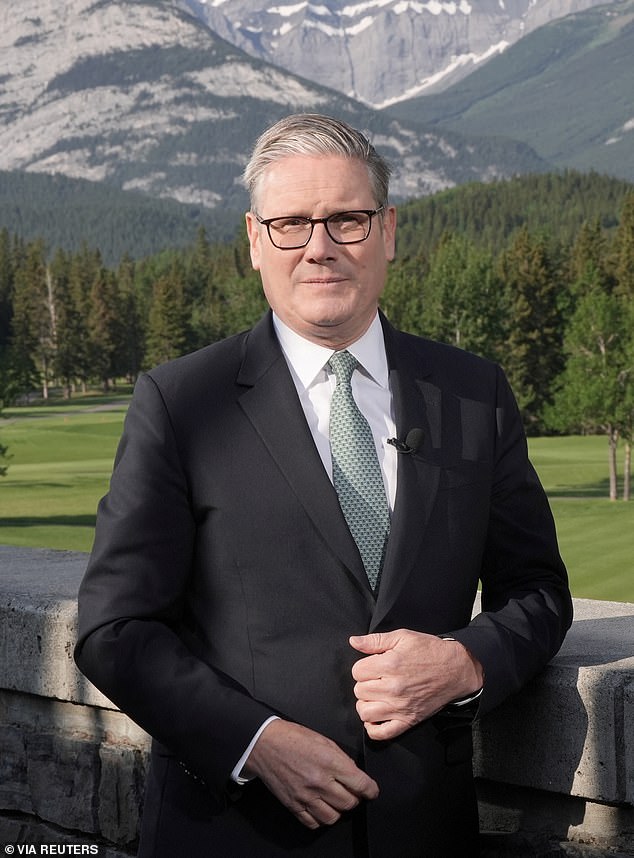A Labour revolt on benefits is gathering pace today after the government published legislation designed to stop handouts spiralling.
Work and Pensions Secretary Liz Kendall said the Universal Credit and Personal Independence Payment Bill would bring ‘compassion’ and ‘dignity’.
But she signalled there will not be substantive concessions despite rising fury from MPs and campaigners over curbs to disability and sickness benefits.
Ms Kendall instead confirmed a marginal change, guaranteeing that those who no longer qualify for Pip will still receive the payments for 13 weeks, rather than just four weeks.
However, impact assessment accompanying the legislation suggests the numbers claiming Pip or Disability Living Allowance will increase 750,000 by the end of the Parliament even after the reforms – with the eye-watering spike in costs only being slowed.
Around 300,000 extra will be claiming UC by 2029-30 than in 2026-27, albeit many at lower rates.
The papers also indicate the timeline for replacing the Work Capability Assessment might be slipping.
Ms Kendall said in March that the checks would be scrapped in 2028 as part of the reforms.
But the document says numbers going through WCA should be 40,000 lower by 2029-30, as a ‘first step in removing the WCA completely’. Aides insisted the date had not changed.
Unveiling the Bill, Ms Kendall said: ‘Our social security system is at a crossroads. Unless we reform it, more people will be denied opportunities, and it may not be there for those who need it.
‘This legislation represents a new social contract and marks the moment we take the road of compassion, opportunity and dignity.
‘This will give people peace of mind, while also fixing our broken social security system so it supports those who can work to do so while protecting those who cannot – putting welfare spending on a more sustainable path to unlock growth as part of our Plan for Change.’

Work and Pensions Secretary Liz Kendall previously warned there are 1,000 new Pip awards every day – ‘the equivalent of adding a city the size of Leicester every single year’


Papers accompanying the legislation suggest the timeline for replacing the Work Capability Assessment might be slipping

Labour MPs have warned the proposals will ‘destroy lives’ and are ‘impossible to support’
The welfare reforms are set to include the tightening of criteria for the main disability benefit in England, personal independence payment (Pip).
An impact assessment for the 370,000 people to have a lower award or lose Pip due to the overhaul by 2029-30.
‘Even with these reforms the overall number of people of working age people on Pip/DLA (disability living allowance) is expected to rise by 750,000 by the end of this Parliament and spending will rise from £23billion in 2024-25 to £31billion in 2029-30.’
Ministers also want to cut the sickness related element of universal credit, and delay access to it, so only those aged 22 and over can claim it.
The package of reforms is aimed at encouraging more people off sickness benefits and into work, and the Government hopes it can save up to £5billion a year by doing so.
That is essential for Rachel Reeves’ efforts to balance the books, although the overall benefits bill would still be increasing.
However, Labour MPs have warned the proposals will ‘destroy lives’ and are ‘impossible to support’.
There are fears dozens of backbenchers will rebel in crunch votes, potentially starting as soon as this month, with even some ministers said to be on resignation watch.
The stakes for Labour have been underlined as a poll showed the party slipping into third place behind Reform and the Tories.
Although other surveys have suggested Nigel Farage‘s advantage is narrowing, the figures are likely to be seized on by those urging a change in direction.
Ms Kendall previously warned there are 1,000 new Pip awards every day – ‘the equivalent of adding a city the size of Leicester every single year’.
The Bill was introduced after the latest benefits data has shown that more than 3.7million people in England and Wales are claiming Pip, with teenagers and young adults making up a growing proportion.
The Department for Work and Pensions figures released yesterday showed there were a record 3.74 million people in England and Wales claiming Pip as of April this year.
That was up from 3.69million in January and a jump of 200,000 from 3.54million a year earlier.
Data for Pip claimants begins in January 2019, when the number stood at 2.05million.
Pip is a benefit aimed at helping with extra living costs if someone has a long-term physical or mental health condition or disability and difficulty doing certain everyday tasks or getting around because of their condition.
Teenagers and young adults account for a growing proportion of those getting Pip.
Some 16.5 per cent of claimants in April this year were aged 16-19, up from 14.6 per cent in April 2019.
The 30-44 age group has similarly grown, while the number of 45-59 year-olds has fallen.
The figure for 60-74 year-olds has risen slightly over this period, from 29.3 per cent to 30.8 per cent.
Sir Keir said he was ‘determined’ to ensure the reforms go through because he feels the welfare system ‘doesn’t work for anyone’.
‘It doesn’t work for those that want to get back to work, and it certainly doesn’t work for the taxpayer,’ the Prime Minister told Good Morning Britain, saying ‘those that need to be protected should be protected’.
‘If you need help in support to get into work, the Government should be providing that support and help to get into work,’ he said.
‘If you do have conditions, disabilities that mean it is impossible for you to work, then you need to be properly protected and supported.’
Downing Street insisted it was ‘crucial to say we are committed to the reforms that we’ve set out’.

Keir Starmer has sounded defiance over the plans to curb disability and sickness benefits
A No10 spokesman said: ‘You’ve heard that from the Prime Minister, the Chancellor, the Work and Pensions Secretary, on the principles behind this and the urgent need for this.
‘You have the statistics, they show we have the highest level of working age inactivity due to ill health in Western Europe.
‘We’re the only major economy whose employment rate hasn’t recovered since the pandemic.’
Pip will remain ‘an important non-means-tested benefit for disabled people and people with long-term health conditions, regardless of whether they are in or out of work’, he said, but added the Government would build a ‘system that is fairer’ through its reforms.
It is thought the restrictions on Pip would slash benefits for about 800,000 people.
The latest More in Common polling has found Labour lost three points of support over the past week, hitting 21 per cent – behind the Tories on 22 per cent.
Reform were ahead on 29 per cent.












